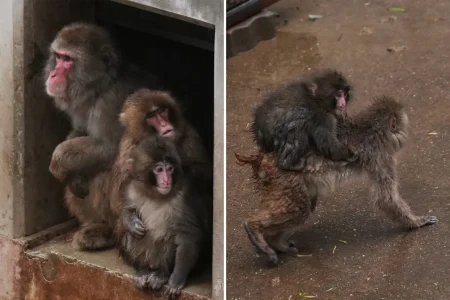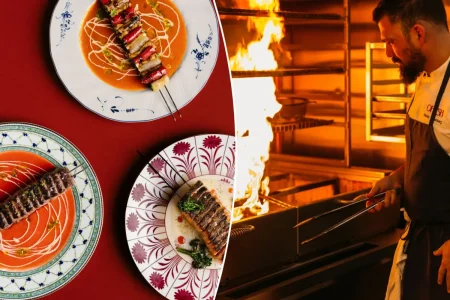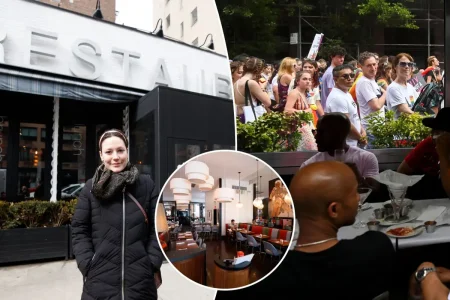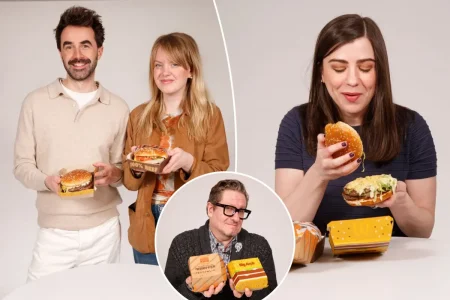The Modern Swingers: A Tale of Love, Community, and Selective Standards
In the heart of Yorkshire, UK, a married couple has transformed their personal exploration of non-traditional relationships into a thriving community. Ashley and Tanya Marum, who married in 2019, began their journey into swinging just months after their wedding when Tanya expressed interest in exploring her bisexuality. “If it’s something you want to explore, we can explore together and see,” Ashley supportively told his wife, setting the foundation for what would become not just a lifestyle choice but eventually a business venture. What began as Tanya’s individual exploration gradually evolved into experiences with other couples, as they discovered the predominantly couple-based nature of the swinging scene. Their story represents a modern approach to marriage that challenges conventional boundaries while paradoxically strengthening their own bond.
The Marums quickly found themselves embraced by what they describe as “such an accepting community of people.” Contrary to popular misconceptions that reduce swinging to mere sexual encounters, Tanya emphasizes that “it’s not all just about sex that people imagine.” Their immersion in this alternative lifestyle has yielded unexpected benefits: they’ve formed meaningful friendships with like-minded individuals, and perhaps most significantly, Tanya believes it has brought her and Ashley “closer together.” This closeness seemingly contradicts what many might assume about non-monogamous arrangements, suggesting that openness and honest communication about desires can actually reinforce rather than threaten the primary relationship. Their positive experiences eventually inspired them to create a platform for others, organizing bi-monthly events that now attract over 300 participants, transforming their personal journey into “our sole life now,” as Ashley describes it.
However, the Marums’ approach to community building has raised eyebrows due to their selective admission criteria. Their events operate with one notable restriction: “no ugly people allowed,” as Ashley candidly puts it. Prospective members must apply through their website with photos, allowing the couple to evaluate physical appearances before granting entry. “I don’t want people there who the majority would think are unattractive,” Ashley explains without apology. While acknowledging the superficial nature of this policy, they frame it as a matter of creating a certain atmosphere rather than cruel exclusion. “We want to try to get people to come that they might not be your type but they’re nice looking and take care of themselves,” Ashley elaborates, suggesting their standard is more about self-presentation than conforming to narrow beauty ideals. This aspect of their operation highlights the complex intersection of personal preference, community standards, and potential discrimination within alternative lifestyle spaces.
The couple’s openness about their lifestyle has yielded mixed reactions from their social circles. Initially hesitant to share their activities due to fear of judgment, they gradually became more comfortable disclosing their non-traditional arrangement to friends. Surprisingly, Ashley reports his male friends expressing envy rather than disapproval: “My friends are like ‘I wish my girlfriend would try this, I wish we could do that.'” This acceptance has extended throughout their social network, with Ashley noting, “Now everybody knows and no one says anything to us.” Family reactions, however, proved more challenging. “My family was not happy about it,” Ashley admits, highlighting the generational and familial tensions that often accompany lifestyle choices that deviate from traditional relationship models. These varied responses reflect broader societal ambivalence toward non-monogamous relationships – simultaneously fascinated and judgmental.
Tanya, who hosts a podcast, sees education as key to normalizing swinging and helping curious individuals make informed choices. “The lifestyle is something a lot of people are curious about but don’t know how to learn about it or how to get into it or how things are done,” she explains. Through her platform, she aims to demystify what she describes as “an unwritten rulebook you’re expected to just know,” interviewing various guests to provide insights that might help others determine if swinging aligns with their values and relationship goals. This educational approach represents an effort to move conversations about non-monogamy beyond sensationalism and stigma, treating it as a legitimate relationship option that deserves thoughtful consideration rather than automatic dismissal or judgment.
Perhaps most importantly, the Marums emphasize that swinging should only be practiced by couples who are “100% in love” – not as a solution to relationship problems. “If you have cracks in your relationship and you think it’s a way to spice things up, you’re doing it for the wrong reasons,” Tanya cautions. This perspective aligns with what British sexpert Adreena Winters suggests in her book “So You Want To Be a Cuckold?” where she proposes that witnessing one’s partner with another person can paradoxically strengthen a relationship. “It may not spring to mind when you think about ways to keep a relationship afloat, but cuckolding can be invaluable,” Winters claims. The Marums’ story illustrates how non-traditional relationship structures can work when built on a foundation of trust, clear communication, and mutual respect – challenging conventional wisdom about what constitutes a successful marriage while underscoring that the key components of relationship satisfaction transcend particular arrangements. Their journey represents just one path among many in the increasingly diverse landscape of modern relationships, where couples are increasingly defining success on their own terms rather than adhering to traditional scripts.













